The Drama Triangle
or Karpman Triangle
what is it and how to get out of it ?
The Drama Triangle is a dynamic involving three roles, in which communication is distorted by the position each participant adopts
Let’s clarify right away: this isn’t about a ménage à trois… but you’ve probably played it before 😁
Also Worth Reading :
The actors ?
A Victim, a Persecutor, and a Rescuer. We’re not describing people here, but roles that any of us can take on at any given moment… or not.
The basic principle ?
Experiencing intense satisfaction in the role you play.
An exemple ?
Victime: “I can’t manage to organise the project meeting. I’ve taken it on, using my time — even though I’m already overloaded, exhausted, and shouldn’t even be here anymore — but no one cares, and no one keeps me informed. It’s not fair. I feel worthless and exploited.“
Persecutor: “Don’t volunteer for a task if you’re not capable of doing it. Now you have to take responsibility. Start by attending the meetings; that’s the bare minimum if you don’t want to be excluded from the project.“
Rescuer: “What’s happening to you isn’t fair. P. is really overdoing it, and you’re not as bad as you think. Don’t worry—I’ll take care of it for you“
Who’s the winner ?
No one, of course! Each person sinks further into their role, and the situation can only go in circles, at best.
This “game,” known as the Drama Triangle or Karpman’s Triangle — named after Dr Stephen B. Karpman, who described it in 1968 — is a model of psychological manipulation involving three players who each seek to satisfy their own interests. It can be summarised as follows:
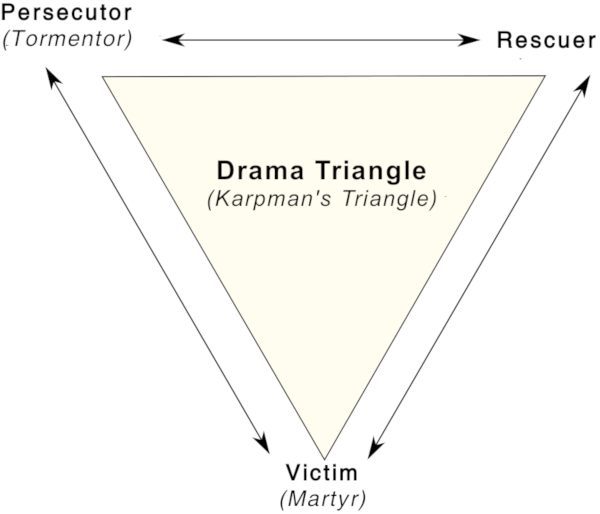
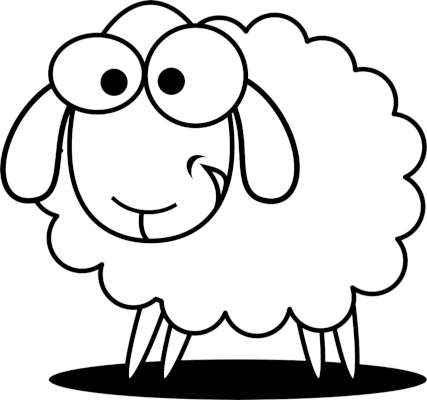
The Victim
- is in a state of suffering or presents as such
- acts as if she or he has no way out
- seeks to attract the attention of a Rescuer who will justify his or her apparent incompetence and prevent her or him from taking responsibility
- seeks to attract the attention of a Persecutor who will validate their status as a victim and thus allow him or her to complain
Their favourite expressions
- “I always do everything that’s needed, even more, and no one is ever satisfied”
- “It’s not fair; I never have any luck”
- “No one understands my situation”
- “No one likes me”
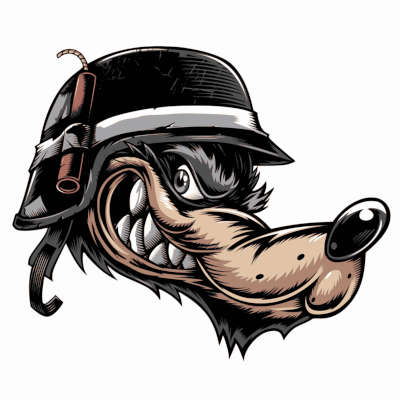
The Persecutor
- imposes his or her will, partly through punishment
- needs a victim, whom he or she won’t respect, in order to feel powerful
- is not necessarily a person, but could also be a factor that justifies the Victim’s role: illness, alcohol, drugs…
Their favourite expressions
- “You never do anything right; thank God I’m here!”
- “You still haven’t learned to…!”
- “You’ll go home when you’ve finished your work!”
- “If you’re too weak to work, you shouldn’t have come!”
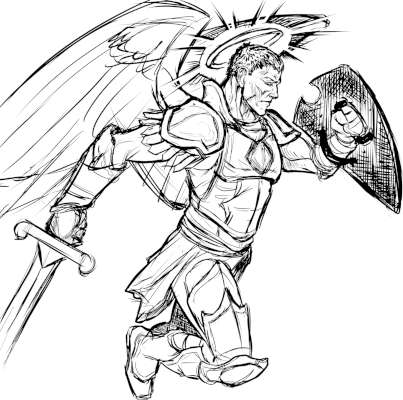
The Rescuer
- values the Victim’s dependency, as without it he or she has no purpose
- relieves the Victim of responsibility by taking charge of their decisions and actions
- has little interest in seeing the Victim solve things on their own
Their favourite expressions
- “don’t worry, I’ll handle it, even though I’ve got other things to do”
- “I’ll help you: I’ll do it for you”
Find out what might pull you into a Drama Triangle:

The Audience
It’s often forgotten, but the Audience also plays an important role, as each of the actors may feel the need for public recognition of their role
The Victim might need it to show that they are powerless in the situation, that they are forced into playing this game, and thus gain the support of other potential Rescuers.
The Persecutor needs it to demonstrate that he is the strong man / she is the strong woman in the situation
and the Rescuer because he / she is convinced they are playing the good guy and enjoys making sure everyone knows it

But who’s the Game Master ?
Each one needs the other to exist in this game. But there is one role that dominates: the Game Master.
Can you guess who it might be?
Let’s go back to the Drama Triangle diagram (the original one by Stephen Karpman, presented here).
The Persecutor and the Rescuer occupy higher positions, dominating the Victim whom they see as inferior.
But at the base of the Triangle, where the foundation of the game lies, is the Victim. Without the Victim, neither the Persecutor nor the Rescuer have a role to play, and the game ceases to exist.
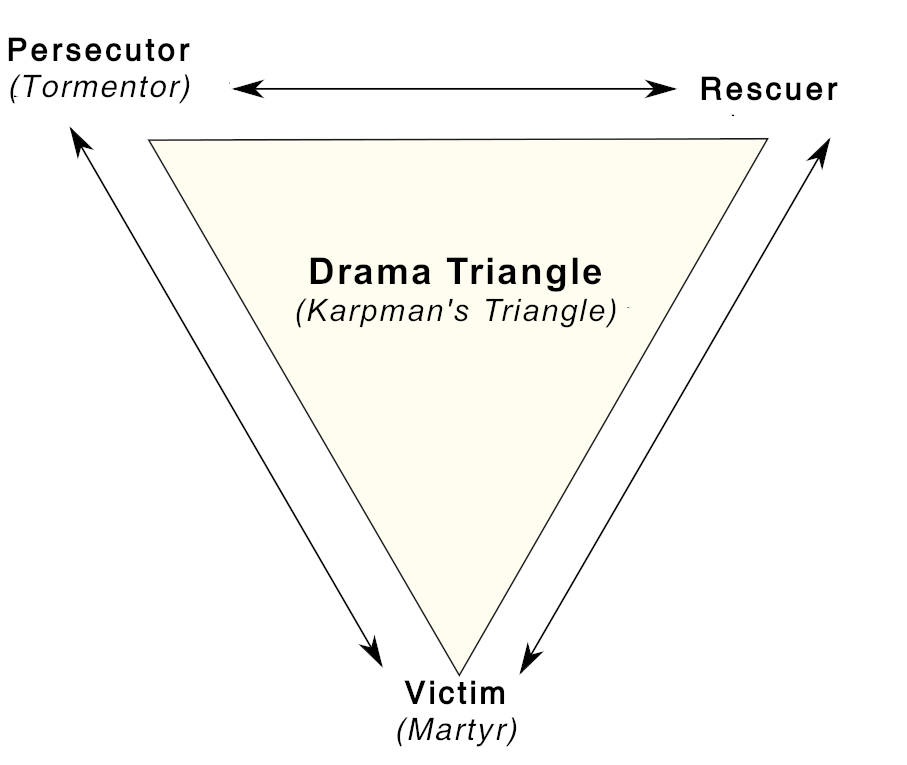
It’s the Victim
who is the true Game Master!
It’s interesting to note that the roles are interchangeable over time.
A Victim can become the Persecutor of a Rescuer if they feel they haven’t been properly saved, and the Rescuer then becomes a Victim, taking on the new role of Game Master. And so it goes on.
How to Avoid Entering a Drama Triangle?
The Drama Triangle pulls its actors into a downward spiral. A few simple questions, among others, can help you avoid getting caught up in it :
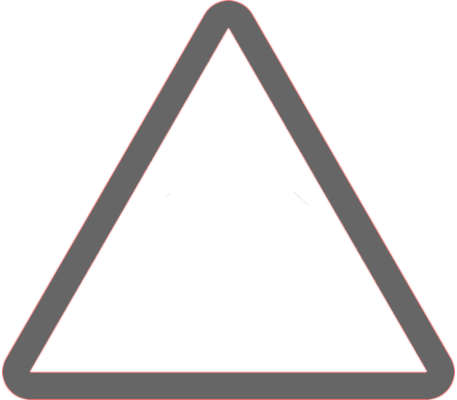
The Victim :
Do I really need help? How can I express my request rationally and without putting myself down? Who is the best person to ask?
The Rescuer :
Did I actually receive a clearly stated request for help? Am I the best person to respond? How can I meet the request without belittling the requester?
The Persecutor :
Have I truly been given the authority to act in this matter? Do I really need to assert my authority? Will I receive appropriate recognition for my actions?
How to Get Out of a Drama Triangle?
Awareness of what is happening within oneself is crucial to avoid being pulled into a Drama Triangle and, most importantly, to break free from it.
It’s easier said than done, of course. However, there are techniques to improve verbal communication, which mainly involve understanding the mechanisms — the neural pathways — we’ve all developed throughout our lives and learning how to change them.
- Understanding how our strengths can eventually turn into weaknesses, or even our inner Saboteurs
- Understanding how what once helped us survive in a challenging environment — a new job, a restructuring, a relocation, or an illness, for example — can eventually turn into a handicap
- Understanding how we act, and how our environment responds in return
- Understanding how to master our Inner Saboteurs and reveal our true selves
In any case, the key is to be aware of what is happening and to avoid falling into familiar patterns.
A shared sense of humour is also a good way to defuse the situation.
And if there’s an Audience, the best approach is to find a way to exclude it from the game. Having a private conversation with the other actors often helps to effectively break the spiral.
Life coach for leaders, managers and project leaders. Professional development. Certified International Coaching Federation coach, work-life balance coach and Mental Fitness coach, InterQualia Flow assessment. Certified coach in Switzerland, Lausanne, Yverdon, Geneva and Online. France & Canada © 2018 – 2025 – Design and production Alternatives et Transitions Coaching
Illustrations credits: personal compositions and pixabay.com

